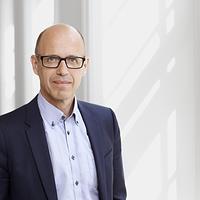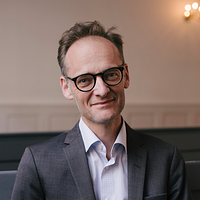Dear Marina Abramovic
Dear colleagues and friends of the university
Last year we had to postpone this event on short notice;
and we were deeply worried about your health.
Now we are even more delighted to welcome you.
Let me take you on a journey to the past.
The place is a dark forest near Ringsted in Southern Zealand.
The year is 1985.
A group of Danish art school students are gathered.
They take part in an experiment under the supervision of Marina Abramovic.
The students are blindfolded.
Marina takes them deep into the forest – and gives them the following task:
“Please return to the teaching facility within an hour”.
One student ends up in a swamp and sits there for hours.
Another gets himself into a residential area.
Local residents see this blindfolded man in funny clothes in their front yard
– and they call the police.
The next day, the local newspaper reported:
“It turned out to be an artist who was learning something
– what the artist learned remains unclear.”
Some of the students are present here today.
And I should add that they all returned without sustaining lasting mental or physical injuries.
As opposed to the newspaper, I think the purpose of the “exercise” is perfectly clear – especially here at the university.
The Abramovic Method bears resemblance to the conduct of basic research, which is driven by open-minded curiosity, not predictable outcomes.
Sometimes you only discover what you were looking for – afterwards.
It is the experimental method of “I wonder what happens if…”
“What happens if” you sit in a chair at MOMA together with strangers
for 3 months – day in, day out?
“What happens if” museum guests have to squeeze past two naked persons when entering a room?
This method does not only apply to art – but certainly also to science.
What happens if two molecules suddenly click?
Morten Meldal – our most recent Nobel Prize winner –
wondered why and discovered click chemistry.
What happens if a fungus apparently wrecks a sample in the lab?
Alexander Fleming wondered why – and discovered antibiotics.
If we are allowed to wonder – wonders will happen.
In an interview, Marina Abramovic said:
“The space from which artists derive their inspiration
is the same space from which scientists or philosophers derive inspiration;
there is no other space.”
Marina Abramovic is spot on.
We need to protect and expand this creative space from which art, science, ideas, curiosity – and indeed life - flow.
There are those who consider basic research as an activity reserved for the few.
The fabulous few in the league of Nobel or Sonning
– like Abramovic and Meldal.
This conception is fundamentally flawed.
Any researcher should have access to this creative space.
Otherwise, the future Hans Christian Ørsted [who looks gracefully down on us]
will not discover electromagnetism – but simply improve the candlelight.
But I would go even further.
The Abramovic method also concerns being a university student.
Education is not just the simple transmission of skills aimed at a fixed purpose or job.
Being a student is learning how to learn.
A way of thinking independently
And not always sticking to the assembly manual.
A method that will enable you to manage almost any problem
you will encounter in life.
However, I will advise our new students not to act as an Abramovic the first week - or year - of their bachelor’s programme.
That experience will be as frustrating as when you deviate from the assembly manual of an Ikea cupboard.
But towards the end of the Master’s degree
– as they research and write their thesis –
all students should have access to the creative space of the Abramovic Method.
It requires time, in-depth thinking and the freedom to develop and pursue truly original ideas.
Dear Marina Abramovic:
Your works have pushed the boundaries of human thinking
– and made us all wonder.
And if we are allowed to wonder – wonders will happen.
It’s a pleasure now to introduce the person who proposed Marina Abramovic as recipient of Denmark’s paramount cultural award:
Minister in the Church of Vartov and lecturer at our Faculty of Theology
- Jesper Tang Nielsen – the floor is yours.

